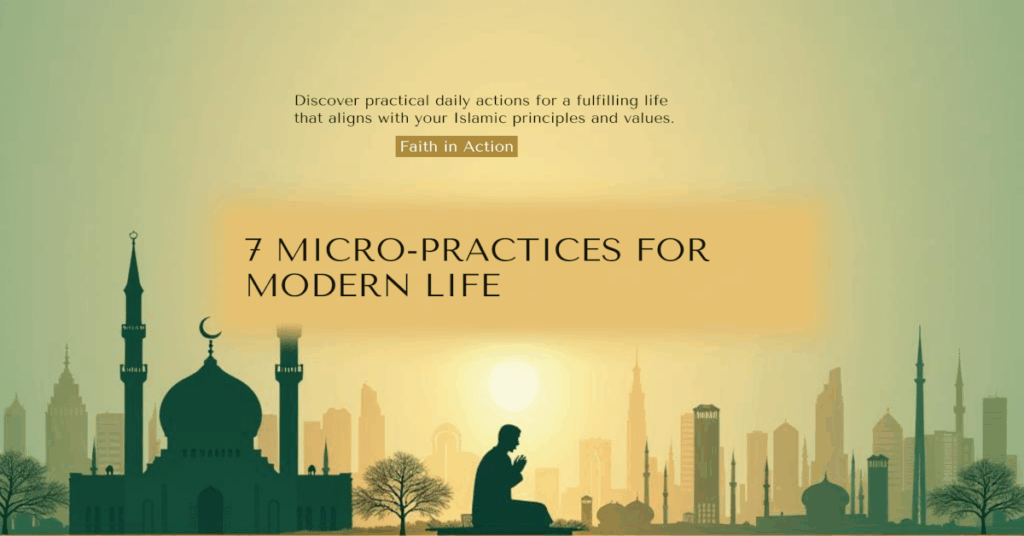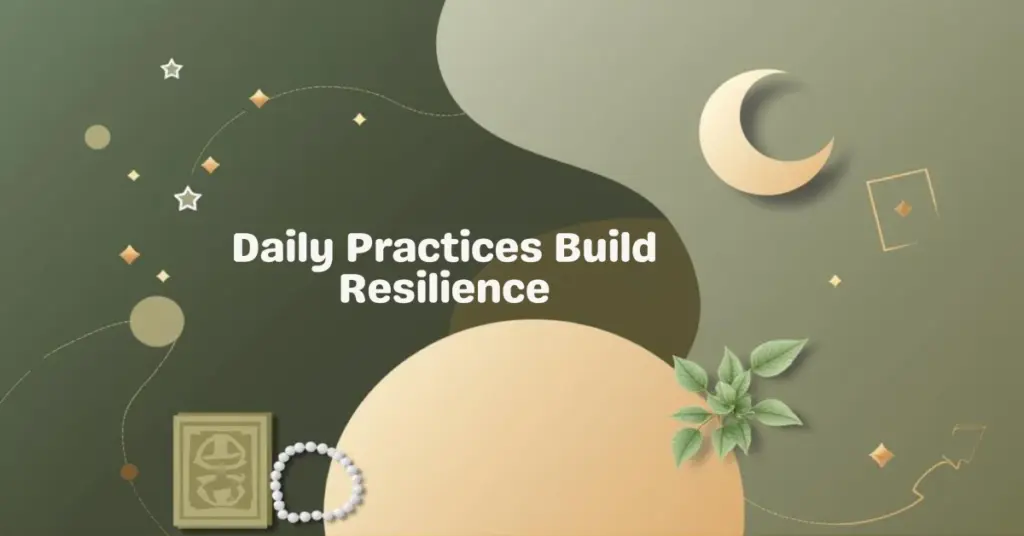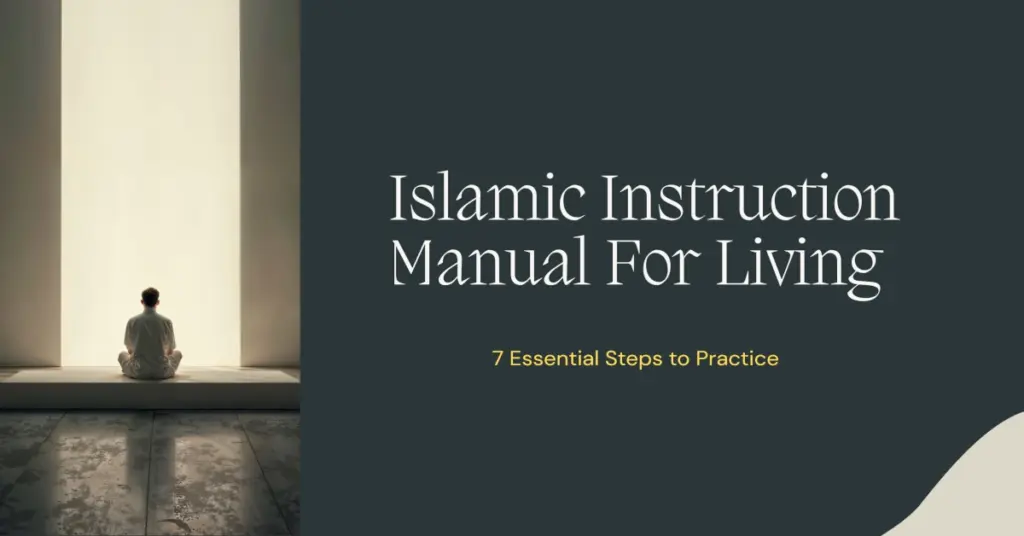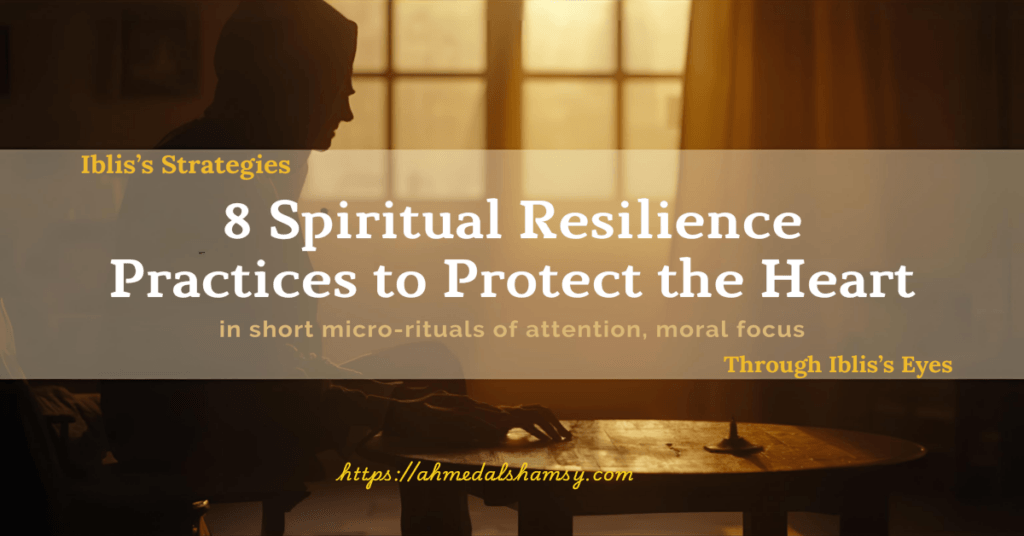AIM — Free & Open
CC BY-NC-SAAIM is free and open for non-commercial reuse. Try a free AIM pilot (CSV + memo) — support is optional and helps sustain translations, research, and free access.
In a noisy, restless world, people are often desperate for a compass. Every day we are flooded with choices: what to say, how to act, where to focus. It can feel overwhelming. Micro-rituals work because they give us tiny, repeatable anchors of stability. They are not grand speeches or overwhelming to-do lists. They are quiet reminders of who we want to be. A whispered dhikr, a conscious breath, or a simple smile at a stranger may look small, but it is exactly these small steps that re-train the heart and steady the mind. These daily moral algorithms translate intention into action in small, measurable steps.
Exclusive Summary — From Revelation to Routine: Living by Daily Moral Algorithms
This article reframes core Quranic principles for life into a compact, testable playbook of practical routines. It arranges guidance across three tiers—foundational principles (Purpose, Presence, Justice, Balance), heuristics (seven one-line decision rules), and repeatable micro-rituals—then explains how to run a 30/60/90 program that makes spiritual formation measurable.
Each step pairs an ayah or hadith, a Seerah vignette, and a modern science insight so readers can (1) adopt one micro-ritual, (2) run a 30-day n=1 trial tracking a single metric (sleep/mood/focus), (3) share progress in a 15-minute weekly shūrā, and (4) conduct quarterly audits to scale what helps. Emphasis centers on moderation, haram-minimization, and community—small, sustainable acts. Start with one two-breath pause or a one-sentence morning alignment; practice the daily moral algorithms, measure, adapt, and let the manual shape habits.
Unlock a practical playbook for living: short Islamic rituals reimagined as daily moral algorithms that sharpen attention, steady choices, and build resilience. Try seven copyable micro-habits, test them across thirty to ninety days, and watch small consistent actions reshape your ethics, focus, and wellbeing. No prior background—just steady, simple practice. Over weeks, daily moral algorithms reshape how you react under pressure.
Table of Contents
Introduction — why micro-rituals are practical moral engines

People often ask for simple rules they can actually use in the messy real world. The phrase daily moral algorithms names a practical idea: short, repeatable scripts that reliably steer attention and action in ethically desirable directions. Islamic tradition has a rich set of such scripts — short prayers, dhikr, brief charitable acts, and formulaic etiquette — that were taught, practiced, and shaped by the Prophet’s life (Seerah) 1 2 . – We explained this in detail here: The Treaty of Hudaybiyyah –
When reframed as actionable micro-habits and connected to modern behavior science, these same routines become testable algorithms anyone can run in daily life to reduce reactive error, cultivate moral attention, and build resilience 3 4 . Practicing daily moral algorithms turns vague goals into everyday proof.
This article will:
- Explain why small rituals act like daily moral algorithms (mechanics + moral design).
- Give seven concrete micro-ritual templates and scripts you can use immediately.
- Offer a 30/90-day program to turn these micro-actions into stable, measured change.
- Link each practical claim to trustworthy scholarship — Qur’anic or hadith anchors and Western scientific research — so you can follow, test, and adapt.
Practicing daily moral algorithms trains attention the way repetition trains the body.
How rituals become algorithms: the three mechanisms
Think about how children feel when they hear a bedtime story every night. The cue (night), the script (story), the outcome (comfort, sleep) — it becomes a rhythm that shapes their inner world. Adults are no different. When we link our actions to rituals, we find shelter from chaos. A prayer before dawn, or a pause before a reply, is not just behavior — it’s a safe harbor in a stormy sea. This predictability frees mental energy, letting us live with clarity instead of constant reactivity. These daily moral algorithms are intentionally tiny so they become sustainable.
A short ritual becomes a reliable algorithm when it does three things repeatedly, You can test simple daily moral algorithms with one metric and one week :
- Cue — a stable trigger that initiates the script (e.g., finishing wudu, sitting at your desk).
- Script — the tiny, fixed sequence you perform (e.g., two breaths, a short dhikr, one sentence of intention).
- Outcome mapping — a measurable, small outcome you can notice (calmer breath, clearer priority, one-kind act).
Families can adopt daily moral algorithms and watch small habits cascade. When the same cue reliably produces the same script and a repeatable tiny outcome, the loop turns into a context-anchored routine that the brain gradually automates 5 6 . Even a single consistent daily moral algorithms habit can change the tone of your week.
This is why ritualized religious practices are effective: they provide clear cues and short, meaningful scripts embedded in community. Over time these daily moral algorithms reduce cognitive load and preserve deliberative energy for genuinely novel choices. 7 – Read more in why doubts happen -. Leaders who model daily moral algorithms create cultures of steady, ethical action.
Four theological-practical anchors (short)

Pairing two daily moral algorithms produces more stability than trying ten. Every human being longs for meaning. Purpose tells us life is not random. Presence whispers that we are seen and loved. Justice assures us that suffering is not ignored. Ease reminds us that we don’t have to break ourselves to live rightly. Whether you are Muslim or simply curious, these anchors resonate because they are human needs. They connect our fragile daily struggles to something bigger, something enduring.
Each micro-ritual below references a short Qur’anic or Prophetic principle so the routine sits within a moral horizon — and that moral anchor makes the practice more motivating for believers while the psychological mechanisms (attention, habit, social reinforcement) make it accessible to non-believers. The most effective daily moral algorithms feel personal and meaning-rich.
- Purpose — Qur’anic reminder that life is oriented; intention matters. [1]
- Presence (taqwa) — brief remembrance that cultivates moral attention. [4]
- Justice & kindness — prioritize dignity & haram-minimization in decisions. 8
- Ease & balance — the prophetic counsel to make religion easy and sustainable. 9
Teachers report students respond quickly to classroom daily moral algorithms.
Seven micro-ritual templates (daily moral algorithms) — scripts & why they work

Below are compact, copy-paste scripts you can try immediately. Each script includes (a) a one-line algorithm, (b) a short proof from the Seerah or hadith, and (c) a brief Western science connection.
1) The Two-Breath Pause — algorithm: Cue → 2 breaths → one-line aim → act
Imagine you’re about to fire off an angry reply to a hurtful message. But instead, you breathe twice, steady your heart, and let your values catch up with your emotions. That moment is like putting brakes on a runaway train. What could have spiraled into regret becomes an act of dignity. Over time, such pauses don’t just change your day — they change your character. Start with one daily moral algorithm, then add another after thirty days.
- Script (30–60 sec): after any message/email that upsets you, stop — inhale twice slowly, read a one-sentence aim (“Preserve dignity & clarity”), then reply.
- Seerah / hadith: the Prophet taught controlled speech and urged saying good or remaining silent.[4]
- Science: breath regulation alters vagal tone and reduces sympathetic arousal, increasing prefrontal control needed for deliberate action.[5]
2) The One-Sentence Purpose (Morning Anchor) — algorithm: Wake → write 1 sentence → prioritize
We wake up with a thousand possibilities tugging at us — emails, deadlines, news, chores. Writing one sentence before the flood is like drawing a boundary for your soul. It’s telling the world: I will not be swept away today. I choose to direct my energy. This little ritual feels like opening the day with courage instead of surrender. These daily moral algorithms do not require religious belief to work.
- Script (60 sec): before phone use, write “Today I will use time to ___ because it builds ___.” Consult it for competing requests.
- Seerah / hadith: “Actions are judged by intentions,” which frames daily acts as morally meaningful.[2]
- Science: purpose orients sustained motivation and improves persistence against temptations (logotherapy, positive psychology). [3]
3) The Micro-Charity Nudge — algorithm: End-of-day cue → give small → note effect
It’s astonishing how a coin in a donation box or a small favor for a colleague can transform not just their mood but yours. The act whispers: you matter, and I can help. Charity on a micro-scale trains us to see others instead of being trapped in our own worries. These small ripples of kindness often reach further than we’ll ever know. You’ll find daily moral algorithms are easier to keep when shared.
- Script (30 sec): set a recurring $1 / small favor at day’s end; note how it shifts mood.
- Seerah anchor: early Muslim practice emphasized measurable support for neighbors and the poor.
- Science: prosocial spending and behavior consistently increase subjective well-being; prosocial acts strengthen social capital and cooperative norms. 10
4) The Halal/Haram Quick-Check — algorithm: Option presented → 3-question check → if any fail, pause
Life tempts us with shortcuts, especially when no one is looking. But pausing for three questions — dignity, haram, honesty — makes you face your conscience. Even non-believers know that a decision taken in integrity feels lighter to carry. Over time, this ritual doesn’t just protect you from mistakes; it builds a reputation others instinctively trust. A notebook helps track progress when testing daily moral algorithms.
- Script (60 sec): ask: preserve dignity? avoid predictable haram? is it honest? If any “no,” delay or ask counsel.
- Seerah anchor: Prophet’s decisions (e.g., clemency at Makkah) prioritized dignity and minimized haram.
- Science: simple ethical checklists improve moral decision quality and reduce drift (decision-making & organizational ethics literatures). 11
5) The Tiny-Habit Stack — algorithm: Existing routine → add 30s ritual → celebrate
What if you could transform ordinary tea time into a sacred pause? Gratitude and intention stitched into daily routines make the invisible sacred. You don’t need to carve out hours. By attaching thankfulness to what you already do, you quietly rewire the day. The cup becomes a chalice, and the ordinary becomes holy. Use daily moral algorithms to create gentle boundaries around your attention.
- Script (30 sec): after tea, recite a two-line gratitude + set one small, specific task.
- Seerah anchor: the Prophet practiced short, repeated invocations; patterns built identity.
- Science: tiny anchors (behavior design) produce higher adherence than grand resolutions.[6] 12
6) The Weekly Accountability Mini-Circle — algorithm: Weekly 15 min → report + commit → close
Humans are wired for connection. Sharing progress with even one trusted friend turns solitary struggle into shared growth. When you tell someone, this week I will do one thing better, the weight lifts because you are no longer alone. These mini-circles echo the companionship of the Prophet’s time — a reminder that transformation is not meant to be walked alone. Even small setbacks teach how to adjust your daily moral algorithms.
- Script (15 min/week): 1) quick check-in; 2) one small aim for next week; 3) name numerical metric.
- Seerah anchor: companions shared learning in majalis and adjusted practice via community feedback.
- Science: public commitments and social monitoring raise follow-through and build reputation systems that sustain habits. 13
7) The Evidence-by-Practice Test — algorithm: Pick 1 habit → 30 days → measure → decide
In a world full of claims, this ritual whispers: try it yourself. You don’t need to take anyone’s word. Test a habit. Watch your mood. Track your sleep. Keep what works. This makes growth a personal discovery, not blind imitation. It’s empowering because it says: your life is the laboratory, your heart is the witness. Community checks magnify the impact of daily moral algorithms over months.
- Script: run an N=1 test: track 2 simple signals (sleep hours, mood 1–5) for 30 days; if measurable gain, keep; if not, adjust.
- Seerah anchor: the Prophet taught iterative practice and community reporting that refined routines.
- Science: single-case experimental designs and behavior-change frameworks let individuals test what works without grand claims. 14
Why these algorithms work together (mechanics + social design)
When these micro-rituals overlap, they form something bigger than themselves. Like threads woven into a net, they hold you when life pulls hard. Alone, one ritual calms you. Together, they create a rhythm that keeps you grounded in storms. This is not about perfection. It is about building a safety net for your humanity, so when you fall — as all of us do — you land in resilience, not despair. Reflecting weekly helps you refine which daily moral algorithms actually help.
Combine a morning purpose sentence + the Two-Breath Pause + a Tiny-Habit Stack + Weekly Accountability and you create a layered ecosystem: cognitive scaffolding (purpose & pause), automatic context cues (habit stack), affect regulation (breathing, micro-charity) and social reinforcement (mini-circle). – Read more in Dealing with doubts in Islam – Habit neuroscience and habit psychology explain the synergy: repeated cues and rewards move responses into basal ganglia circuits; social accountability stabilizes environmental cues; rituals reduce error-related negative affect so people perform under pressure.[5][6][7] 15
A practical 30-day plan

We often fail because we try to change everything at once. This plan is different: it honors human limits. It says: start small, grow gently. Just as a tree does not bear fruit overnight, your rituals need time to root. The beauty is in patience. Each week is a gentle step, proving that transformation is not beyond reach — it is waiting in the next small act.
Week 1 — Foundation:
- Daily morning: one-sentence purpose.
- Use Two-Breath Pause for all responses that feel reactive.
- Track Sleep (hrs) + Mood (1–5).
Week 2 — Stack:
- Add Tiny-Habit (after tea): 30-s gratitude + one micro task.
- Find 1 accountability partner.
Week 3 — Socialize:
- Start weekly 15-min check-in with partner.
- Run Halal/Haram Quick-Check on one recurring decision.
Week 4 — Evaluate:
- Run Evidence-by-Practice: compare week 1 averages vs. week 4. If mood or focus improved, continue; if not, adjust the micro-ritual. The goal is not perfection but steady use of daily moral algorithms.
A 90-day resilience pathway (30/60/90)
Resilience is not a sprint. It is cultivated like a garden — watered regularly, pruned carefully, growing slowly. By 90 days, the rituals no longer feel like chores. They feel like part of your identity. The shift is subtle but profound: you stop asking how do I force myself? and begin saying this is simply who I am now.
Month 1 — Establish micro-algorithms (as above).
Month 2 — Consolidate: add one communal ritual (short study circle or service).
Month 3 — Scale & audit: quarterly audit of the four anchors (Purpose, Presence, Justice, Balance). Increase one practice only if metrics show consistent improvement.
This slow, evidence-driven scaling avoids burnout and mirrors the Prophet’s communal, iterative teaching approach: small steps, regular review, and communal reinforcement.[2][9]
Practical examples (short case studies)
Stories bring numbers to life. Layla’s brighter mornings, Omar’s calmer decisions, Fatima’s more attentive students — they show that behind every ritual is a real human victory. We may not publish these in journals, but they are victories nonetheless: better nights of sleep, fewer regrets, moments of peace. These “ordinary” results are in fact extraordinary, because they change the course of a life.
- Layla (student): did Two-Breath Pause + morning purpose — sleep improved by 30–45 minutes and morning study focus rose, per her weekly self-report.
- Omar (manager): added Halal/Haram Quick-Check to hiring decisions — fewer regrets, improved retention scores.
- Fatima (teacher): used a 60s classroom grounding ritual — measured improvement in attention by short quizzes.
These anecdotal examples illustrate how daily moral algorithms transform intention into measurable difference.
Common mistakes & troubleshooting
Failure is not proof you are weak; it is proof you are human. Everyone stumbles. The Prophet himself taught that the best people are those who, when they fall, stand up again. Troubleshooting is not shameful; it is wisdom. Adjust the anchor. Lighten the load. Ask for help. Small corrections keep you moving — and the journey matters more than a flawless record.
- Too big, too soon: scale micro-rituals at 30s–2mins at first.
- Anchor drift: place visible cues in the environment.
- No social support: add a 1-person accountability loop.
- Measurement fatigue: drop to 1 metric (e.g., sleep hours) for a month.
How non-Muslim readers can adopt these algorithms
Even if faith is not your path, these rituals still speak to something human. To breathe before speaking is universal. To give a small kindness is human. To anchor the day in meaning is necessary for anyone who longs for more than survival. These micro-algorithms are bridges. They connect believers and seekers, Muslims and non-Muslims, because they honor what we all share: a longing to live wisely, kindly, and with purpose.
Translate theological cues into secular language: “remembrance” → mindful noticing; “charity” → prosocial action. The psychological mechanisms (cue → script → outcome) are the same and produce measurable benefits regardless of belief.[10][12] – Read more in Respectful Questions to Ask About Islam –
Conclusion — test your own daily moral algorithms
Translate theological cues into secular language: “remembrance” → mindful noticing; “charity” → prosocial action. The psychological mechanisms (cue → script → outcome) are the same and produce measurable benefits regardless of belief.[10][12]
Over time, daily moral algorithms become the small rituals that define you.
In the end, life is not about the size of your rituals but the sincerity of them. Every pause, every intention, every small act of charity is a brick in the foundation of your character. Do not wait for perfect conditions. Begin with one breath, one word, one step. Test it. See the change. You may discover that the smallest rituals carry the greatest strength.
FAQs
1. What are “daily moral algorithms” in Islam?
Daily moral algorithms are short, repeatable habits—like dhikr, intentional pauses, or charity—that guide everyday decisions, improve focus, and help align life with Islamic values while remaining practical for modern routines.
2. Are these rituals only for Muslims?
No. While rooted in Islamic teachings, the micro-habits—such as mindful breathing, gratitude journaling, or ethical decision filters—are universal and backed by psychology, making them useful for non-Muslims as well.
3. How long do these practices take each day?
Most daily moral algorithms require 1–3 minutes. The goal is consistency, not intensity. Over time, even short practices accumulate into lasting change.
4. How do these rituals build resilience?
They reduce impulsive choices, anchor attention, and create a sense of meaning—factors proven in psychology and neuroscience to boost resilience under stress.
5. Can these routines replace therapy or counseling?
No. They are spiritual and behavioral tools, not medical treatment. For mental health concerns, professional help should be sought, and these rituals can complement formal care.
6. What’s the science behind small habits?
Research on habit formation shows that tiny, consistent actions are more sustainable than drastic changes. They rewire the brain’s reward system, making positive behavior automatic over time.
7. How can I measure my progress?
Use simple metrics: track sleep hours, mood ratings, and number of daily focus sessions. Combine with self-reflection to see tangible improvement over 30–90 days.
8. Do these habits have a basis in the Qur’an and Hadith?
Yes. The article cites ayat and authentic hadiths for each step, showing how Islamic teachings emphasize intention, justice, moderation, and resilience in daily life.
9. How do I stay motivated after the first week?
Pair rituals with accountability—like sharing progress with a friend—or link them to existing routines (e.g., after brushing teeth, repeat one dhikr). Small anchors keep momentum.
10. What’s the first step I should start with?
Begin with one: a one-sentence morning intention or a two-breath pause before reacting. Mastering one habit builds confidence and makes adding others easier.
References
- The Qur’an. Surah adh-Dhariyat (51:56). Translation reference: Abdel Haleem, M.A.S. The Qur’an: A New Translation. Oxford University Press, 2004. (For textual quotations use a reliable translation such as Abdel Haleem or Khan/Muhsin as preferred.) ↩︎
- Hadith: “Innamā al-a‘māl bin-niyāt” — Sahih al-Bukhari, Book of Faith/Intention (see Bukhari, Book 1 / major hadith collections; canonical English translations available at Sunnah.com and authoritative printed translations). ↩︎
- Frankl, Viktor E. (2006). Man’s Search for Meaning. Beacon Press. (Classic on meaning and resilience; original 1946; modern editions available). ISBN-13: 978-0807014295. ↩︎
- Qur’an. Surah Aal-ʿImrān (3:102). Translation reference: Abdel Haleem, The Qur’an: A New Translation, OUP. ↩︎
- Hölzel, B. K., Carmody, J., Vangel, M., Congleton, C., Yerramsetti, S. M., Gard, T., & Lazar, S. W. (2011). Mindfulness practice leads to increases in regional brain gray matter density. Psychiatry Research: Neuroimaging, 191(1), 36–43. doi:10.1016/j.pscychresns.2010.08.006. ↩︎
- Fogg, B. J. (2020). Tiny Habits: The Small Changes That Change Everything. Houghton Mifflin Harcourt. ISBN-13: 978-0358003326. ↩︎
- Wood, W., & Rünger, D. (2016). Psychology of habit. Annual Review of Psychology, 67, 289–314. doi:10.1146/annurev-psych-122414-033417. ↩︎
- Qur’an. Surah an-Nisa (4:135) — justice guidance (translation reference: Abdel Haleem). ↩︎
- Seerah example (Hudaybiyyah / Conquest of Makkah): classical Seerah accounts — Ibn Ishaq (Ibn Hisham recension) and modern English studies such as Watt, W. Montgomery. Muhammad: Prophet and Statesman. Oxford University Press, 1961. ISBN: 978-0198222895. ↩︎
- Dunn, E. W., Aknin, L. B., & Norton, M. I. (2008). Spending money on others promotes happiness. Science, 319(5870), 1687–1688. doi:10.1126/science.1150952. ↩︎
- Kahneman, D. (2011). Thinking, Fast and Slow. Farrar, Straus and Giroux. ISBN-13: 978-0374275631. (For heuristics and decision biases.) ↩︎
- Clear, J. (2018). Atomic Habits: An Easy & Proven Way to Build Good Habits & Break Bad Ones. Avery (Penguin Random House). ISBN-13: 978-0735211292. ↩︎
- Cialdini, R. B. (2006). Influence: The Psychology of Persuasion (expanded edition). Harper Business. ISBN-13: 978-0061241895. (On public commitments & social effects.) ↩︎
- Kazdin, A. E. (2010). Single-Case Research Designs: Methods for Clinical and Applied Settings (2nd ed.). Oxford University Press. ISBN-13: 978-0195365664. (On N=1 experimental designs.) ↩︎
- Hobson, N. M., Bonk, D., & Inzlicht, M. (2017). Rituals decrease the neural response to performance failure. PeerJ, 5, e3363. doi:10.7717/peerj.3363. ↩︎
Discover more from Ahmed Alshamsy
Subscribe to get the latest posts sent to your email.







